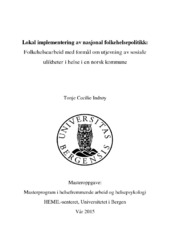| dc.contributor.author | Indrøy, Tonje Cecilie | |
| dc.date.accessioned | 2015-08-10T10:54:21Z | |
| dc.date.available | 2015-08-10T10:54:21Z | |
| dc.date.issued | 2015-05-21 | |
| dc.identifier.uri | https://hdl.handle.net/1956/10252 | |
| dc.description.abstract | Målsetting: Denne studien tar for seg en norsk kommunes oppfølging av folkehelseloven. Formålet med studien har vært å skaffe kunnskap om hvordan kommunen organiserer sitt folkehelsearbeid, hvordan folkehelselovens formål om utjevning av sosiale ulikheter i helse ivaretas lokalt der spesiell oppmerksomhet vies innvandrerbefolkningen. Tre forskningsspørsmål er utarbeidet: 1) Hvordan organiserer kommunen sitt folkehelsearbeid etter at folkehelseloven trådte i kraft og hvilken folkehelseforståelse ligger til grunn for arbeidet på feltet? 2) Hvordan er hensynet til sosiale ulikheter i helse ivaretatt i folkehelsearbeidet og hvilken forståelse for sosiale ulikheter i helse ligger til grunn? 3) Hvordan er hensynet til innvandrerbefolkningen ivaretatt i folkehelsearbeidet? Metode: Det er brukt en kombinasjon av datatilfang som er vanlig i kvalitative casestudier, der intervjuer utgjør primærkilden og kommunale dokumenter utgjør sekundærkilden. Funn og diskusjon: Funnene viser at kommunen har gjort mange grep i tråd med folkehelselovens krav til systematisk folkehelsearbeid som gir utslag i en helhetlig tilnærming til folkehelse i beslutnings- og planprosesser. Likevel oppleves utfordringer med den helhetlige satsingen som skal være resultatet av plan- og beslutningsprosessene, dette knyttes til velkjente utfordringer med samarbeid og koordinering i offentlig sektor. Det fremkommer at det finnes flere parallelt eksisterende forståelser av folkehelse og sosiale ulikheter i helse, som påvirker prioriteringer og tiltak i folkehelsearbeidet. Dette kan knyttes til underliggende politiske verdier som gjør det vanskelig å oppnå reell enighet om satsing på dette området, noe som får økende oppmerksomhet i internasjonal litteratur på feltet. Kommunen er bevisst på innvandrerbefolkningens sårbare situasjon og spesielle utfordringer, uten at bevisstheten gir seg særlig utslag i tjenester og tiltak. Innvandrerbefolkningen blir behandlet ut fra et ressursfokus, og ansvaret for integrering er lagt til kommuneorganisasjonen som helhet. Spørsmålet er om det er en god løsning overfor en del av befolkningen som er ekstra sårbare for helseutfordringer basert på sosiale forhold både der de kommer fra, og sosiale forhold som er resultater av å være innvandrer i et fremmed samfunn | en_US |
| dc.description.abstract | Objective: This study addresses a Norwegian municipality's follow-up of the Public Health Act. The purpose of this study has been to obtain knowledge of how the municipality is organizing its public health work, how the Public Health Acts' purpose of tackling the social inequalities in health are being safeguarded locally where special attention is devoted to the immigrant population. Three research questions have been elaborated: 1) How does the municipality organize its public health work after the Public Health Act took effect and what public health understanding underlies the work in the field? 2) How is the consideration of social inequalities in health taken care of in the public health work and which understanding of these inequalities underlies it? 3) How is the consideration of the immigrant population taken care of in the public health work? Method: The data has been collected through a combination of data collection methods, which is quite common in qualitative case studies. Interviews constitute the main source and municipal documents the secondary. Findings and discussion: The findings show that the municipality has taken many efforts according to the Public Health Acts demand for systematical public health work which gives way to an integral approach to public health in resolution and planning processes. Still challenges are experienced in the integral commitment that is to be the result of the planning and resolution processes, tied to well-known challenges regarding cooperation and coordination in the public sector. It shows that there are several parallel exisisting understandings of public health and social inequalities in health, which influence priorities and measures within the public health work. This can be tied to underlying political values that make it difficult to achieve actual agreement in this area, something that gains increasing attention in international literature on the field. The municipality is aware of the immigrant population`s vulnerable situation and particular challenges, without giving any special outcomes in services and measures. The immigrant population is treated with a focus on resources, and the responsibility for integration is left to the municipality`s organization as an entirety. The question is if this is a good solution for a part of the population which is especially vulnerable to health problems based on social circumstances both from where they migrate from, and as a result of being an immigrant in a foreign society. | en_US |
| dc.format.extent | 1133673 bytes | en_US |
| dc.language.iso | nob | eng |
| dc.publisher | Universitetet i Bergen (UiB) | eng |
| dc.title | Lokal implementering av nasjonal folkehelsepolitikk: Folkehelsearbeid med formål om utjevning av sosiale ulikheter i helse i en norsk kommune | eng |
| dc.type | Master thesis | |
| dc.date.updated | 2015-08-04T12:09:18Z | |
| dc.rights.holder | Copyright the author. All rights reserved. | eng |
| dc.description.degree | Master i Helsefremmende arbeid og helsepsykologi | |
| dc.description.localcode | HEFR395 | |
| dc.description.localcode | MAPS-HEFR | |
| dc.subject.nus | 761901 | |
| dc.subject.keyword | sosial ulikhet | |
| dc.subject.keyword | helse | |
| dc.subject.keyword | kommune | |
| dc.subject.keyword | Socioeconomic Status | |
| dc.subject.keyword | Health | |
| fs.subjectcode | HEFR395 | |
